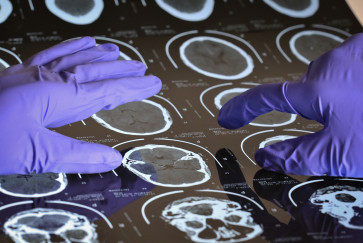Northwestern University announced today it will create a multimillion-dollar technology accelerator in downtown Evanston to support startup companies led by Northwestern faculty in health, life sciences and related fields, amplifying scientific discovery and innovation by supplying the laboratory space, networking opportunities and management training necessary to address the world’s biggest problems.
The collaborative space will provide a home for Northwestern’s highly entrepreneurial faculty to contribute to innovation through commercialization of sophisticated scientific discoveries and will bring economic growth and opportunities to the Evanston and Chicago communities.
To foster technology-based economic development, the Illinois General Assembly appropriated $50 million for this project as part of the state’s 2022 capital budget. Kimberly K. Querrey (’22, ’23 P), chair of the Innovation and Entrepreneurship Committee of Northwestern’s Board of Trustees, was so committed to making the accelerator a reality that she has personally made a $25 million gift to Northwestern to advance innovation and entrepreneurship. The accelerator, at 1801 Maple Ave. in downtown Evanston, will be named in her honor.
It takes the work out of the lab into a translational space to help University researchers get their discoveries out to the marketplace and to the patient’s bedside.”
Chair of the Innovation and Entrepreneurship Committee of Northwestern’s Board of Trustees
“This accelerator represents a transformative investment by the state and by one of Northwestern’s most generous donors, which will shine a spotlight on our cutting-edge research and innovation and help the University recruit top talent,” Northwestern President Morton Schapiro said.
“This investment, by the state and Northwestern, will help create new tech companies and new jobs in Evanston and will repay us many times over in future prosperity for our community,” added state Rep. Robyn Gabel who represents downtown Evanston in the Illinois House of Representatives.
Querrey, along with Provost Kathleen Hagerty, many trustees and faculty, have been instrumental in driving the 1801 Maple Ave. accelerator project in support of Northwestern’s strategic plan.
“This effort will expand on Northwestern’s rich tradition of innovation and entrepreneurship by providing researchers with a launching pad for new ventures. It takes the work out of the lab into a translational space to help University researchers get their discoveries out to the marketplace and to the patient’s bedside,” Querrey said. “This space will benefit the entire University community, the local community and beyond, and it is extremely exciting to see it take shape.”
“I am truly grateful to Kimberly Querrey for her vision, generosity and partnership that have benefitted so many areas of Northwestern over the years,” Schapiro said. “Her latest gift will enable the University to seize on this opportunity to expand our innovation and entrepreneurship ecosystem, and much sooner than we anticipated.”
Space for entrepreneurial technology
Northwestern plans to renovate existing laboratory and office space at 1801 Maple Ave. The completed project will include labs and collaborative workspace for startup companies as well as offices for program staff and startup advisers.
The space will foster a transformative and inclusive entrepreneurial community. Today’s announcement comes just a week after the University announced the renovations of two academic buildings.
Related: Northwestern plans major facilities projects to bolster academic and research efforts
“Northwestern has an outstanding track record for entrepreneurial technology innovation,” Provost Kathleen Hagerty said. “The scientific work of our researchers is nothing short of breathtaking, and the establishment of this exciting new accelerator further advances our faculty’s remarkable capacity for addressing global and local challenges through our academic and entrepreneurial efforts.”
World-renowned materials scientists John Rogers and Mark Hersam will be the first to occupy the new space. They will soon be joined by four additional early-stage startups in the fields of synthetic biology, nanotechnology and flexible materials.
Rogers, a MacArthur Fellow and a member of three National Academies (Science, Engineering and Medicine) as well as the National Academy of Inventors, is piloting Rhaeos, a company that has developed technology for use in the monitoring of ventricular shunt function in patients with hydrocephalus, a condition that causes a build-up of fluid on the brain. Rogers is the Louis Simpson and Kimberley Querrey Professor of Materials Science and Engineering, Biomedical Engineering and Neurological Surgery.
Hersam, another MacArthur Fellow, American Association for the Advancement of Science Fellow and member of the National Academy of Inventors, is piloting Volexion, the developer of a graphene coating for lithium-ion batteries that dramatically increases their energy, cycle life and safety. Hersam is the Walter P. Murphy Professor of Materials Science and Engineering.
This investment, by the state and Northwestern, will help create new tech companies and new jobs in Evanston, and will repay us many times over in future prosperity for our community.”
Illinois State Representative
The accelerator will establish a dynamic environment that draws from and supports Chicago and Evanston entrepreneurial partners through opportunities such as in-residence programming.
“Northwestern has a long, impressive history of successful achievement in the entrepreneurial technology space,” Associate Provost for Innovation and New Ventures Alicia Löffler said. “INVO has helped catalyze this ecosystem with pioneering efforts such as The Garage, Lakeside Discovery and many training programs. Today, we are excited to be on the cusp of a transformative initiative that will further accelerate Northwestern’s research innovations and translational ability to produce even greater societal benefit.”
Vice President for Research Milan Mrksich said the on-campus accelerator will let Northwestern support translational efforts, particularly for first-time faculty entrepreneurs.
“This significant investment in Northwestern's entrepreneurial activities is exciting and timely,” Mrksich said. “Support for the space comes as the University’s research ecosystem thrives and is approaching $1 billion in annual sponsored funding. The facility, together with new coaching and business services, will significantly grow the number of companies that translate our basic science into commercial technologies that benefit society.”
Innovation at Northwestern
With $887 million in sponsored research funding just last year, Northwestern is recognized globally for its high-impact research, spanning academic disciplines and profoundly contributing to society through the commercialization of new products and services. Each year, approximately a dozen new companies spin out of the University’s research enterprise in cutting-edge areas such as bioelectronics, nanotechnology and synthetic biology.
Related: Research funding breaks through to $887 million
Kellogg School of Management Dean Francesca Cornelli noted that Kellogg looks forward to partnering with leading researchers from across Northwestern to translate scientific innovations into commercial successes.
“This provides a unique opportunity for Kellogg to work directly with cutting-edge scientists to leverage customer insights and develop financial and operational models that will help bridge scientific success and commercial success,” Cornelli said.
The establishment of this exciting new accelerator further advances our faculty’s remarkable capacity for addressing global and local challenges through our academic and entrepreneurial efforts.”
Northwestern Provost
Among recent Northwestern startups that typify the innovative translational work of the University are Exicure, based on Chad Mirkin’s spherical nucleic acid innovation, which is a public clinical stage company developing life-saving therapeutics; Sibel Health, based on research from the lab of John Rogers, which creates soft biosensors for comprehensive vistal sign monitoring; SwiftScale Biologics, based on research from the lab of Michael Jewett, which uses cutting-edge cell-free and bacterial production platforms to rapidly produce protein therapeutics at reduced time and cost; and Minute Molecular Diagnostics, based on research from the lab of David Kelso, which develops fast and easy molecular diagnostics at point of care, including recent work on COVID-19 detection.
“This is just the kind of innovation the state imagined when it built this kind of funding into our budget,” said Illinois House Speaker Emanuel “Chris” Welch. “This state investment, matched by private funds, will capture the University’s hard work and discoveries and translate them into the products and services needed to spur economic growth in Illinois and beyond.”


